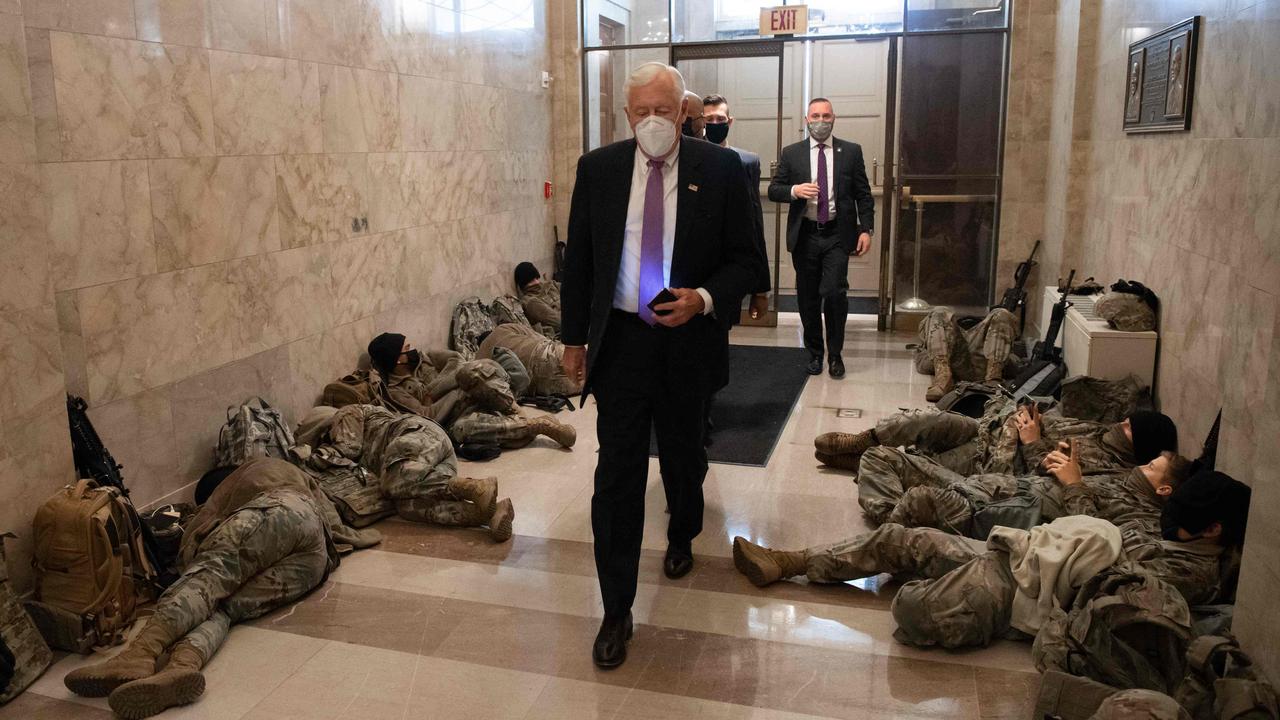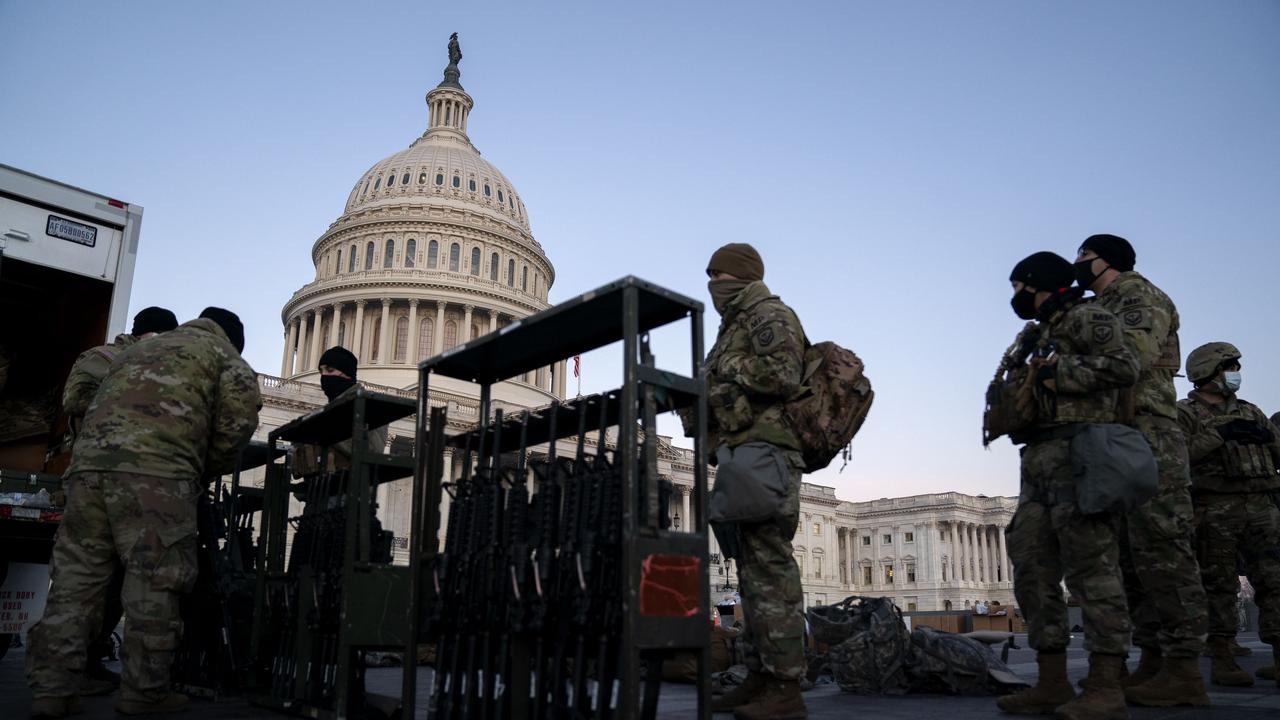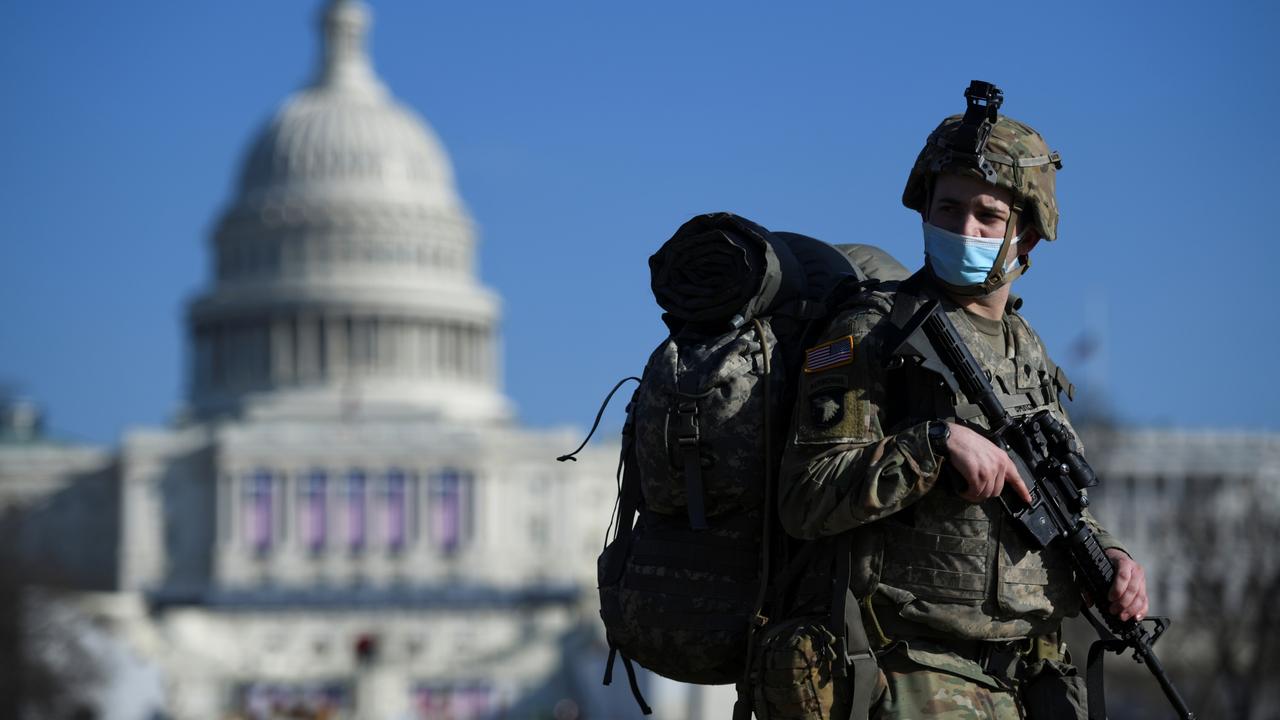With nerves raw and troops on guard, House impeaches President Trump
The US Capitol has become a military zone as Congress assigns blame for last week’s riot.

As the House weighed removing President Trump from office for last week’s violent riot, a small army was on hand to make sure another attack didn’t happen.
Hundreds of National Guard troops and police officers were stationed throughout Capitol Hill Wednesday, a week after a mob of the president’s supporters overwhelmed police, ransacked the building and left five dead. Some troops rested by statues of American icons inside the Capitol, laying their assault-style weapons beside them on the marble floors. Others stockpiled riot shields and gas masks. Five-ton armoured trucks cut off traffic in the surrounding neighbourhood.
Already largely void of visitors and staff because of the coronavirus pandemic, the halls of American democracy were transformed into a military zone, with many lawmakers and staff on Capitol Hill still reeling from last week’s violence.
Much of the physical damage from the attack, when rioters forced lawmakers to delay the ratification of Joe Biden’s election victory, had been repaired by Wednesday. Glass was replaced on the door near the House chamber where a Capitol Police officer shot one of the rioters, who later died, and broken furniture and debris were swept away.
But for lawmakers, many of whom police rushed to secure locations during the attack, the events of last week were still raw. Democrats moved rapidly to bring the article of impeachment to the floor, winning the support of a handful of House Republicans, and law-enforcement officials are bracing for more potential violence in Washington and in state capitals.

“They may have been hunting for Pence and Pelosi to stage their coup, but every one of us in this room right now could have died,” said Rep. Jamie Raskin (D., Md.), one of the House impeachment managers, referring to Vice President Pence and House Speaker Nancy Pelosi.
Rep. Zoe Lofgren (D., Calif.), who worked as a staffer during the impeachment inquiry into Richard Nixon before serving in Congress for Bill Clinton and Mr. Trump’s impeachments, said Mr. Trump’s statements encouraging supporters to march on the Capitol didn’t require extensive investigation. Mr. Trump became the first president in American history to be impeached by the House twice.
“What happened this time was in plain view. I mean, he incited a right-wing mob of insurrectionists to come and overturn constitutional government a week ago,” Ms. Lofgren said. “You don’t need a long investigation to find that out.” Republicans opposed to impeaching Mr. Trump said they, too, were shaken by the attack. Rep. Nancy Mace (R., S.C.), in her first speech on the House floor, said she had sent her children home last week before the attack because she was concerned about violence in Washington. She said the impeachment process was too rushed for her to support, though she said she holds Mr. Trump accountable for the violence.
“Not only were our lives in danger but if my kids were here their lives would have been in danger, too, the two most precious people in my life, ” Ms. Mace said.
Capitol Hill has seen a number of other changes since the attack: House leadership has required members to go through a metal detector before coming to the floor, though several Republicans have skipped the screening. In a tunnel connecting the House chamber to offices, signs on the wall thanked Capitol Police officers for their service during the attack. One officer, Brian Sicknick, died after he was hit in the head with a fire extinguisher. Rioters injured other officers.
Rep. Jason Crow (D., Colo.), a military veteran who had been among those trapped in the House gallery, said in an interview that he walked around the Capitol complex after the siege and went up to the officers, as many as he could find, and thanked them for their bravery and courage. He has a personal relationship with some of them, and later checked up on them by phone.
“One of them broke down to me and said he was trying to hold the crowd back and eventually they overwhelmed him and the crowd was just walking over him and they were beating him,” Mr. Crow said.
When Rep. Brian Mast (R., Fla.), also a combat veteran, came across National Guard troops on Wednesday, he chatted with them before offering them a brief tour of the building. Other lawmakers brought pizza to the troops. By the afternoon, some of the National Guard troops inside the Capitol had started to move outside. Mr. Mast said the heavy military presence within the Capitol made him “as sad as anything could make me in this world.” “To see the foundation of our democracy attacked … sad is not an appropriate word, it goes well beyond that. It’s sad, it’s disgusting, it’s despicable, it’s unpatriotic, pick your words,” said Mr. Mast, who voted against impeachment.
The attack and impeachment effort have laid bare deep fissures in the GOP, as members weighed their anger over last week’s events against the potential for political and personal attacks for crossing Mr. Trump.
Unlike Mr. Trump’s last impeachment, White House officials haven’t vocally advocated against impeachment. House Minority Leader Kevin McCarthy (R., Calif.) has surveyed other Republicans if he should press Mr. Trump to resign. Other Republicans have sought to punish Rep. Liz Cheney (R., Wyo.), the No. 3 House Republican, for supporting impeachment.
Rep. John Curtis (R., Utah) said he would have voted to impeach the president if Congress had more time to do so.
“The whole thing started surreal — this can’t be happening. I’ve moved through that, like any grieving process — anger, anger at the president, anger with this whole process, and it’s just unfortunate that we can’t slow down and do this right,” Mr. Curtis said.
The Wall Street Journal




To join the conversation, please log in. Don't have an account? Register
Join the conversation, you are commenting as Logout